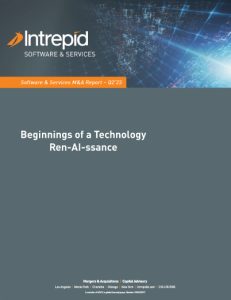Halfway through 2023, the markets are proving to be resilient, albeit with conflicting signals. On one side of the coin, there are worrying economic indicators such as the U.S. Treasury yield curve, which has become the most deeply inverted in decades, as well as heightened short-term interest rates. On the positive side, U.S. GDP has been growing at a steady clip, the labor market remains tight, and the public equity markets have rallied. In fact, the S&P 500 has exceeded analyst expectations with +16% YTD growth while the Nasdaq Composite had its strongest first half to a year ever. But what’s particularly encouraging is that tech sector stocks led the first half charge, with the S&P 500’s tech stocks outperforming the total index by nearly 38%!
So, what’s driven tech’s recent rally and why has it so heavily impacted the public markets? And what will it mean for M&A going forward? While improved profitability and resilient growth have contributed, investors have eagerly bought into the hope of an AI renaissance, or “ren-AI-ssance”.
The emergence and productization of a subset of artificial intelligence termed Generative Pre-trained Transformers (“GPT”) is proving to be a catalyst for the current investment climate. The timing of tech’s rebound is not a coincidence – OpenAI’s ChatGPT released in November 2022 and added 100 million users by January 2023, becoming the fastest growing app in history (until recently). But the explosive release of ChatGPT and its ensuing productization triggered a race among tech companies to release complementary AI tools and avoid ‘missing the boat’. We believe the current tech rebound is, in part, pricing in the promise of AI disruption.

To read the full report, click here
The pronounced impact of AI on the public tech sector largely comes down to scale and capitalization. Notably, some of the top tech performers this year are large cap companies at the forefront of AI, including Microsoft, who has invested nearly $11 billion in OpenAI, and NVIDIA, who is producing the AI-specific computer chips. The AI renaissance, however, is not limited to developers and chip manufacturers; everyday companies are looking to introduce new AI-driven products or supplement existing products through the use of AI. Zoom recently launched its Zoom IQ tool that can summarize video meetings and chats. Salesforce launched AI Cloud to supercharge its CRM platform with GPT capabilities. AI has captured so much of investors’ mindshare that when Google’s Bard chatbot provided an erroneous answer at a demonstration in February, Alphabet’s stock dropped 9%.
Substantial amounts of private capital from both investors and strategic buyers is also flowing into artificial intelligence. Through the first half of 2023, nearly $44 billion of institutional capital was invested into AI-focused companies, of which approximately $38 billion came from venture firms. This skew toward venture funding suggests we are still in the very early stages of AI adoption despite the R&D in the space for over a decade.
We at Intrepid expect an increasing number of companies to forgo spending their R&D budgets on creating their own artificial intelligence engines, and instead, acquire into the capabilities and focus on integrating them into their existing platforms. These bolt-on acquisitions of AI solutions can be an efficient use of capital and ultimately give these buyers a competitive edge and reduce their time to market. We have already observed buyers paying a premium for AI-related companies and expect this trend to continue for those with first mover advantage.
Advancements in artificial intelligence are clearly causing a secular shift in how technology companies will operate in our modern society. If you have any thoughts that you would like to share on the topic, please feel free to reach out – we would love to continue the conversation!


